
The politics of Latvia takes place in a framework of a parliamentary representative democratic republic, whereby the prime minister is the head of government, and of a multi-party system. The President holds a primarily ceremonial role as Head of State. Executive power is exercised by the government. Legislative power is vested in both the government and parliament, the Saeima. The Judiciary is independent of the executive and the legislature. The Economist Intelligence Unit rated Latvia a "flawed democracy" in 2022.

The Liberals of Andorra is a conservative-liberal political party in Andorra. It is a member of the Liberal International and the Alliance of Liberals and Democrats for Europe.
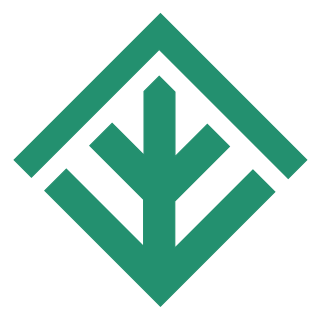
The Latvian Green Party is a green conservative political party in Latvia.
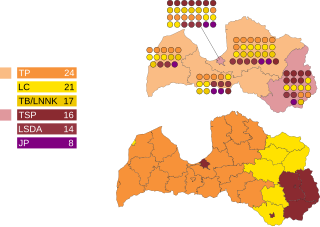
Parliamentary elections were held in Latvia on 3 October 1998. The People's Party emerged as the largest party in the Saeima, winning 24 of the 100 seats.

Parliamentary elections were held in Latvia on 5 and 6 June 1993, the first after independence was restored in 1991. Latvian Way emerged as the largest party in the Saeima, winning 36 of the 100 seats. A total of 23 parties participated in the elections, although only eight received 4% or more of votes and won seats. Voter turnout was 91.2%, the highest in the country's history. Only 66–75% of Latvian residents were citizens and qualified to vote, with the majority of those not able to vote being Russian.

For Fatherland and Freedom/LNNK was a free-market, national conservative political party in Latvia. In 2011, it dissolved and merged into the National Alliance.
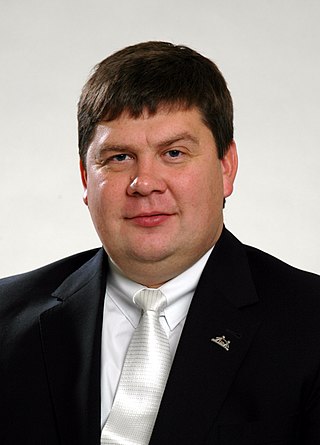
Aigars Kalvītis is a Latvian businessman and a former politician who was the Prime Minister of Latvia from 2004 to 2007. Currently he is the president of Latvian Ice Hockey Federation and the Chairman of the Board of Latvian gas company Latvijas Gāze. He is the Chairman of the Council of Latvian telecommunications company Tet.
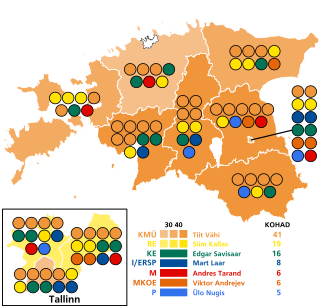
Parliamentary elections were held in Estonia on 5 March 1995. The newly elected 101 members of the 8th Riigikogu assembled at Toompea Castle in Tallinn within ten days of the election. The governing parties were heavily defeated, except for the Reform Party, the successor of Estonian Liberal Democratic Party. The biggest winner was election alliance consisting of Coalition Party and its rural allies, which won in a landslide victory. The alliance won 41 seats, achieving the best result in an Estonian parliamentary election so far as of 2023.
The Democratic Party is a centre-right political party in Bulgaria led by Alexander Pramatarski. The party was a member of the European People's Party (EPP).

Parliamentary elections were held in Poland on 19 September 1993. All 460 members of the Sejm and 100 senators of the Senate were elected. The elections were won by the left-wing parties of the Democratic Left Alliance and the Polish People's Party, who formed a coalition government. The coalition was just four seats short of a supermajority.

Parliamentary elections were held in Latvia on 7 October 2006. The governing coalition, led by Prime Minister Aigars Kalvītis and his People's Party, won the election. Kalvitis's government thus became the first to be re-elected since Latvia had regained independence in 1991.

The Society for Political Change was a social-liberal political party in Latvia founded on 6 September 2008. Its members include two former ministers, former foreign minister Artis Pabriks and former economics minister Aigars Štokenbergs; its first president was economist Gatis Kokins.

Parliamentary elections were held in Latvia on 2 October 2010. It was the first parliamentary election to be held in Latvia since the beginning of the economic crisis during which Latvia had experienced one of the deepest recessions in the world.
Unity is a liberal-conservative political party in Latvia. It is a member of the New Unity alliance and is positioned on the centre-right on the political spectrum. Since 2017, its chairman of the Main Board has been the former Minister for Economics of Latvia, Arvils Ašeradens, who succeeded former European Commissioner Andris Piebalgs.
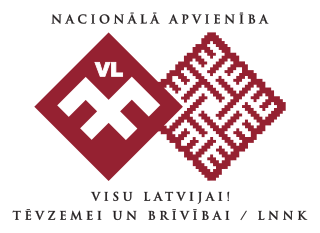
The National Alliance, officially the National Alliance "All for Latvia!" – "For Fatherland and Freedom/LNNK", is a national-conservative political party in Latvia.

Early parliamentary elections were held in Latvia on 17 September 2011, following the country's first parliamentary dissolution referendum held on 23 July 2011. The previous parliamentary election was only held in October 2010.

The National Liberal Party was a political party in Bulgaria.

The Latgalian Farmer-Labour Party, also known as the Latgalian Progressive Farmers, was a political party in Latvia during the inter-war period. The party contested elections in an alliance with several other parties under the name United List of Latgalian Small Landless Farmers and Latgalian Labour Party. It was led by Jezups Trasuns.

The Labour Party is a minor political party in Moldova led by Gheorghe Sima.
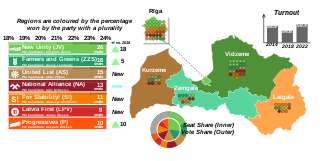
Parliamentary elections were held in Latvia on 1 October 2022 to elect the Fourteenth Saeima of Latvia, following the end of the term of the 13th Saeima elected in 2018.


















